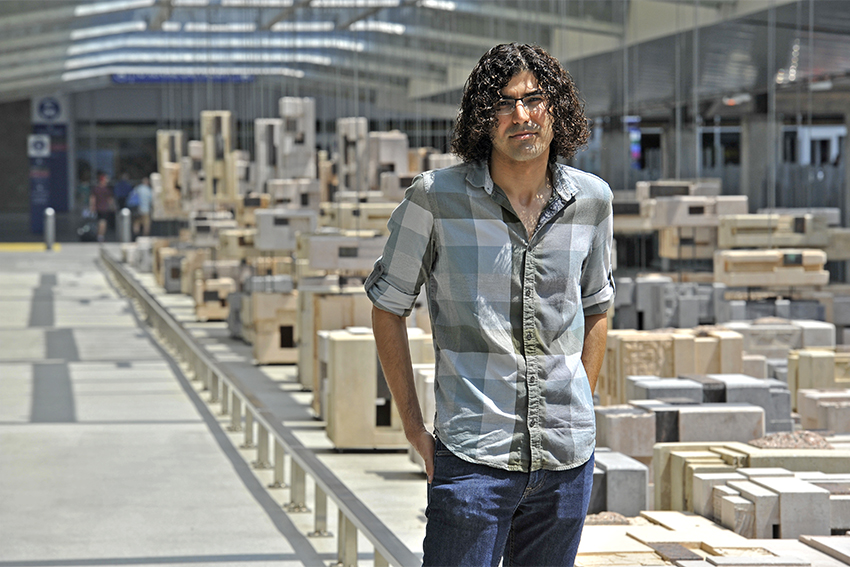Navid Yaghmazadeh recalls feeling disheartened the moment he went to pick up guest tickets for his graduation from UT. Looking at the tickets, Yaghmazadeh knew his Iranian parents would never be able to attend because of Trump’s travel ban.
“I didn’t even bother inviting them because there were no possibilities to have them here,” Yaghmazadeh said. “During my graduation, I could only FaceTime with them, but I couldn’t hug them. These are important times in my life.”
Iran, Yaghmazadeh’s birthplace, is one of seven countries President Donald Trump prohibited entry from through his travel ban upheld by the U.S. Supreme Court in late June.
UT has roughly 139 students from places included in Trump’s travel ban: North Korea, Syria, Iran, Yemen, Libya, Somalia and Venezuela, according to 2017 University data.
The travel ban aims to defend the nation’s borders, Trump said in a White House statement on June 26, the day of the ban.
“We have to be tough, and we have to be safe,” Trump said. “At a minimum, we have to make sure that we vet people coming into the country — we know who’s coming in, we know where they’re coming from.”
After graduating in December, Yaghmazadeh became a postdoctoral fellow in computer science at UT and spends almost nine hours a day in UT’s Gates Dell Complex. To become as immersed in UT’s computer science community as he has, Yaghmazadeh had to give up his home.
The ban will also affect incoming UT students and current UT faculty members. If any students and faculty go home to the banned countries, it is unlikely they would be able to come back, said Kamran Aghaie, Middle Eastern studies associate professor and adviser to international students.
“We will lose some, many won’t apply, those who’ve applied and been admitted will presumably not be able to come here,” Aghaie said. “Those who are here are living in constant jeopardy.”
Yaghmazadeh came to UT when he was 22 and has spent the past eight years here. He started out as a doctoral student and has stayed to pursue opportunities he cannot find back home.
“I came here because I have a dream,” Yaghmazadeh said. “ I wanted to be successful. … Now, if you come to the U.S. you have to choose between your dream versus your family.”
Yaghmazadeh said his parents are sad they cannot see their son anymore, but tell him, “Just go ahead with your dream, follow your dreams and try to be successful.”
Fiona Mazurenko, International Office marketing manager, said the ban applies to the entry of tourists from Syria, Iran, Yemen, Libya and Somalia.
“Relatives or friends of students would not be able to travel to the U.S. for graduations or other special occasions,” Mazurenko said.
As a postdoctoral fellow, Yaghmazadeh conducts program synthesis research for the University and presents his research papers at several different conferences each year.
Yaghmazadeh said he was invited to a very important conference last year, but since it was held in Canada, he was unable to go. At the conference, he received a distinguished paper award for an entry he had worked on for a year, but was unable to accept the award in person.
“I missed that moment,” Yaghmazadeh said. “You work hard and the moment which you are achieving something, you cannot be there to enjoy your moment.”
Yaghmazadeh then proudly pointed to the certificate for the award placed right next to his Ph.D. diploma in his office in the GDC.
“That’s the ‘Best Paper’ award,” Yaghmazadeh said. “My adviser accepted it on my behalf, and she brought it here for me.”
Yaghmazadeh has another conference coming up he cannot attend, this time in Brazil.
“These (conferences are) important for my career … but I can’t go there simply because of the travel ban,” Yaghmazadeh said. “I can’t do anything about it.”
On Jan. 27, 2017, Trump signed an executive order enacting the travel ban. At the time, Yaghmazadeh was a doctoral student at the University.
After the announcement of the ban, Yaghmazadeh typed up a sign, which read “I am from Iran. I am a student. I am NOT a terrorist. I am NOT scary!” and taped it to the back of his laptop.
“I was super happy to see all of these people coming to me and saying, ‘Hey, we are supporting you, we would like you to be here,’” Yaghmazadeh said. “What I have received from people here — that’s why I am still here.”















